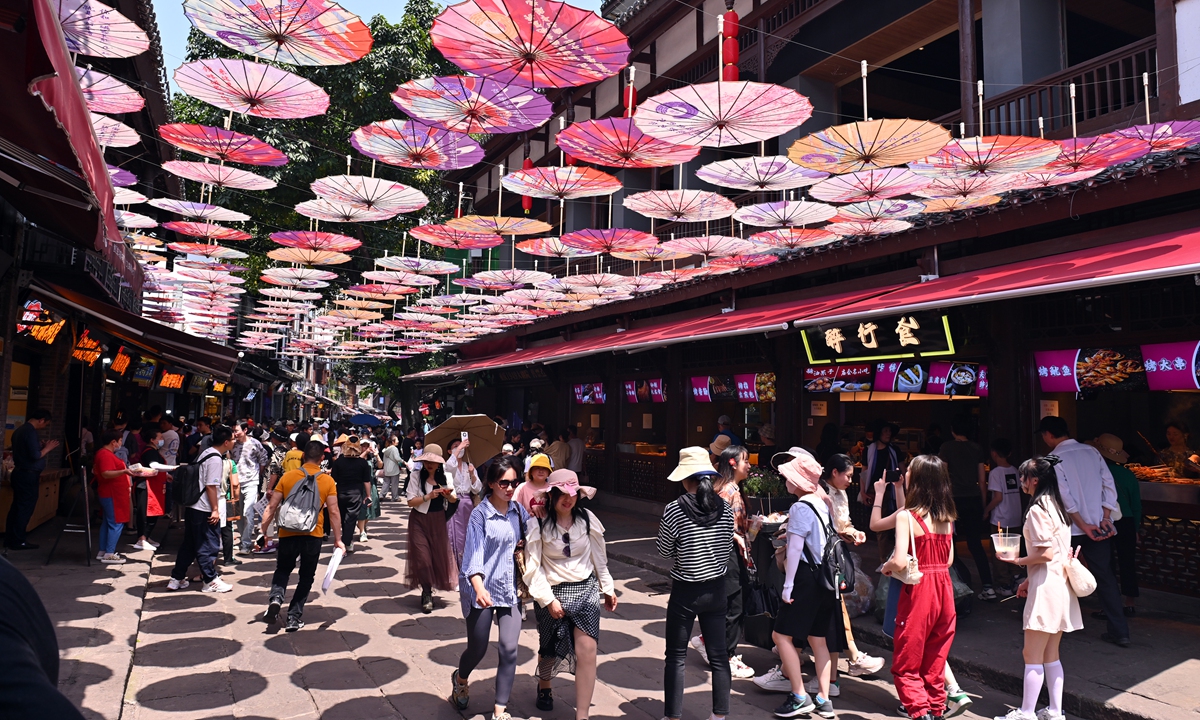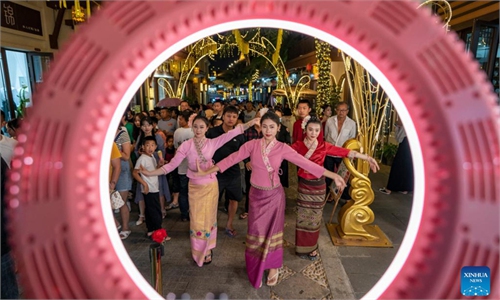
Tourists visit a popular tourism spot in Southwest China's Chongqing Municipality on April 16, 2023. As the five-day May Day holidays draw near, many places around China have entered a warming-up period with soaring tourist arrivals. The "hottest" travel season in five years is expected, with bookings rising as much as 200 percent from 2019, said online travel platforms. Photo: VCG
Chinese tourists' anticipation toward the upcoming May Day holidays and enthusiasm to travel have been dampened as hotel rates in some popular tourism destinations skyrocket, with multiple market watchdogs in localities vowing to curb potential rises.
Hotel rates in tourist destinations such as Lijiang and Dali in Southwest China's Yunnan Province, Xi'an in Northwest China's Shaanxi Province and Hangzhou in East China's Zhejiang Province have surged two to five times for the long-awaited holidays, and netizens are complaining about hotel "assassins," a buzzword for commodities or services with much higher prices than expected.
On some travel platforms, the rate for a three-star hotel room in Xishuangbanna, Yunnan is 289 yuan ($42) for one night if tourists check in on April 25, but it will cost 1,352 yuan per night if tourists check in on May 1.
From budget inns and high-end hotels to luxury resorts, most hotels in China have doubled or even tripled their rates, with some places costing thousands of yuan.
Statistics from online travel platforms indicate that hotel rates in most popular tourist destinations from April 29 to May 3 are higher than those in the same period in 2019. Rates in cities like Beijing, Tianjin, Hangzhou, Wuhan, Shanghai and Jinan are 25 percent more expensive on average than they were during the May Day holidays in 2019.
Some tourists complained online that their reservations were canceled by hotels with various excuses, such as overbooking or the need to do renovations. However, the rooms turned out to be available again at higher rates.
Industry insiders said that the problem reflects an imbalance in supply and demand after three years of epidemic. Statistics from the China Hospitality Association showed that as of the beginning of 2022, the number of hotels in China had fallen by about 86,000, or 25 percent, and the total number of hotel rooms was down by about 470,000, or 24.7 percent, from the pre-pandemic figures.
The numbers contrasted with the unexpectedly strong rebound of the tourism industry since the beginning of this year, after demand suppressed for three years was released.
An industry insider based in Shanghai told the Global Times on Sunday that many small and medium-sized hotels failed to survive in the past three years.
Meanwhile, a number of tourist destinations saw more arrivals in the first quarter than during the same period in 2019, which the insider attributed partly to the spillover effect of some popular destinations such as Zibo in East China's Shandong Province, which shot to fame almost overnight for its barbecue, while other cities famous for their barbecue meals also gained.
Statistics from Trip.com showed that travel bookings in Zibo increased by 441 percent during this May Day holidays from the level in 2019. The surging demand drove up local hotel rates, with an economy hotel in the city charging as much as 1,000 yuan a night.
In a move to curb potential gouging during the holidays, the local market regulators issued a notice on Saturday, demanding that hotel rates for the upcoming holidays should not rise by more than 50 percent, with violators facing a penalty. The reference rate will be based on the actual rates from March 1 and 31, the notice read.
Market watchdogs in other tourism destinations including Taijiang county in Southwest China's Guizhou Province, Changsha in Central China's Hunan Province and Yanji in Northeast China's Jilin Province have followed suit.



